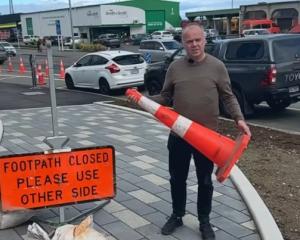

The political machine did start to stir back into life this week though, Labour’s caucus holding a two-day retreat in Nelson.
One thing the party’s MPs probably discussed behind closed doors was the need for the Government to start generating some legislation for Parliament to consider.
Granted the Order Paper usually looks thin at the end of a session and that Parliament has only just resumed sitting following the election, but even so there is not much of substance sitting there at the minute.
Of the 20 items listed on the final sitting day last year, two were notices of motion which were dealt with then, five were Treaty of Waitangi settlement Bills, and at least three were Bills left over from Parliaments past which the present Government has no intention of actually debating in Parliament’s future.
Of the remaining Bills, two are in Dunedin MP David Clark’s name, although they are reforms he has inherited since his return to Cabinet rather than proposed law changes he has initiated.
That said, Dr Clark has a more than passing acquaintance with the Fair Trading Amendment Bill, having introduced it at first reading on behalf of an absent then-commerce minister Kris Faafoi.
In that speech, made almost a year ago, he said the law change would make clear that the Government expected that business in New Zealand would be conducted honestly and fairly, and that it "drew a line in the sand" in respect to proper commercial conduct.
There were similar calls for honesty and fairness made when Mr Faafoi introduced the Financial Markets (Conduct of Institutions) Amendment Bill.
The legislation, which proposes new rules of conduct for banks, insurance companies and other financial institutions, was inspired by Australia’s 2017 royal commission of inquiry into its banking sector.
That found that many of its banks, which through transtasman ownership happen to also be many of our banks, had practices which were at best dubious and at worst disgraceful.
Those strong New Zealand connections meant that, not unnaturally, there were calls for a similar exercise on this side of the Ditch.
Bowing to that pressure, the Reserve Bank and the Financial Markets Authority carried out a joint review, but its finding that conduct and culture issues did not appear to be widespread in New Zealand was greeted with a loud "Yeah, right" by many.
The Ministry of Business, Innovation and Employment was asked to draw up some options for the Government to tighten up the sector, and the amendment Bill is the result.
If you are the Government, the process behind both Bills has been good law making: reviews have been held, stakeholders have been consulted and provisions which should provide greater protection for consumers have been the result.
If you are the Opposition on the other hand, the whole process has been a total waste of time and effort, with the Government proposing to create new regulations where an old commitment to do business legally and fairly already sufficed.
Be that as it may, unless more pressing business emerges, second-reading debates on both Bills should reach the top of the Order Paper by early March.
After those are disposed of there is little standing between them, and the Health (Fluoridation of Drinking Water) Amendment Bill — which was last debated in June 2016 — and the Kermadec Ocean Sanctuary Bill, which successive governments have been stalling on since March of the same year.
A similar situation faced Labour during the last Parliament, when National tried to speed up the House by only speaking for a few seconds of its allotted time, forcing Labour MPs to drone on drearily to fill the time.
Voters can only hope Labour comes out of the gates running in 2021 so that Parliament can spend its time productively.

Immersion course
Ingrid Leary has been the MP for Taieri for only a minute and a-half, but she has already had an early experience of the lot of an electorate MP.
Ms Leary was in the North Island for her mother’s birthday, when she had to drop everything and race home due to the extensive flooding brought about by our stellar summer weather.
She was out and about on the plain for what remained of the emergency, and has pledged to work with the community on flood mitigation in the future.










